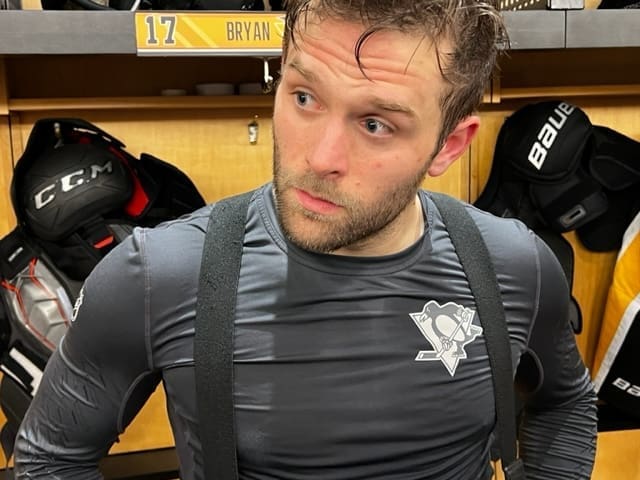Penguins
Reminder: Versatile Rust Is a Man For All Reasons

Mike Sullivan appreciates what an asset Bryan Rust is for the Pittsburgh Penguins.
That Rust has top-six talent and a blue-collar work ethic, that he is versatile and responsible enough to be deployed in any situation.
Which doesn’t necessarily mean that Sullivan is inclined to do that.
Not if he can avoid it, anyway.
Which, with one of the Penguins’ core penalty-killers, Ryan Poehling, unavailable Tuesday because of an unspecified upper-body injury, Sullivan concluded was not possible.
Or, at least, not practical.
So Rust, who had quality penalty-killing as one of the early entries on his NHL resume, was added to the Pittsburgh Penguins’ shorthanded rotation against the Blue Jackets, joining Teddy Blueger, Jeff Carter and Josh Archibald.
Sullivan could have given that assignment to, say, Kasperi Kapanen, but obviously liked what he saw from Rust. That would explain why Rust was on the ice for five full minutes of penalty-kills, just one second shy of Brian Dumoulin’s team-leading total, as the Penguins prevented Columbus from scoring on any of its five chances with the man-advantage.
“He’s a really good penalty-killer,” Sullivan said. “He’s very familiar with the scheme. He’s killed penalties here for most of his career here. He’s always a guy we can go to. Quite honestly, he’s one of our best, when we utilize him. We choose not to sometimes because we’re trying to manage his workload.”
Oh, and there’s one other thing that Sullivan didn’t mention: Penalty-killing is dangerous work — there’s a lot of shot-blocking involved — so coaches generally try to avoid putting key players (like, oh, top-six forwards) in such high-risk situations.
The Penguins were reminded of the merits of that cautious approach while killing a high-sticking minor to Jake Guentzel late in the first period Tuesday.
Rust was struck on the left hand by a shot, and had to adjourn to the locker room to have it looked at, forcing him to miss several minutes before the intermission.
He was able to return for the start of the second period, but acknowledged after the game that he thought he might have suffered a significant injury.
“It didn’t feel too good,” Rust said. “I was definitely concerned.”
His left forefinger was bandaged after the game, but he appeared to be otherwise unscathed.
Which means he fared a lot better than Columbus did after he got back in the game.
Just 75 seconds into the middle period, Rust swept a loose puck between the legs of goalie Elvis Merzlikins from the left side of the crease to lift the Penguins into a 1-1 tie.
“I was just trying to get to the net as hard as I could,” Rust said. “I saw it kind of squirting there, and I just tried to whack at it.”
He whacked well.
Rust’s relentless style made that goal possible; the defensive acumen that makes him an effective penalty-killer was responsible for the Penguins’ fourth one.
He intercepted a Patrik Laine pass near the Pittsburgh Penguins’ blue line and carried the puck to center ice before launching a shot toward the net Merzlikins had tried to vacate in favor of an extra attacker.
Merzlikins scrambled back toward the crease and Rust’s shot went wide, but Blueger collected the rebound off the back boards and tossed it into the net before Merzlikins got there.
“I saw their goalie was out of the net,” Rust said. “I tried to shoot it in myself. I missed. I probably should have made the pass to Teddy, just to begin with.”
Rust had to settle for an assist on that goal. But considering that it was his sixth point in two games — an outburst than came in the immediate wake of a stretch during which he went six games without a point and had just one goal in 14 games — he didn’t have much reason to be unhappy.
“When things aren’t going your way or you’re not playing (well), you worry about hurting the team,” he said. “You just try to get back on track and help the team win games.”
And so he has. On all counts. In every way he’s asked.


